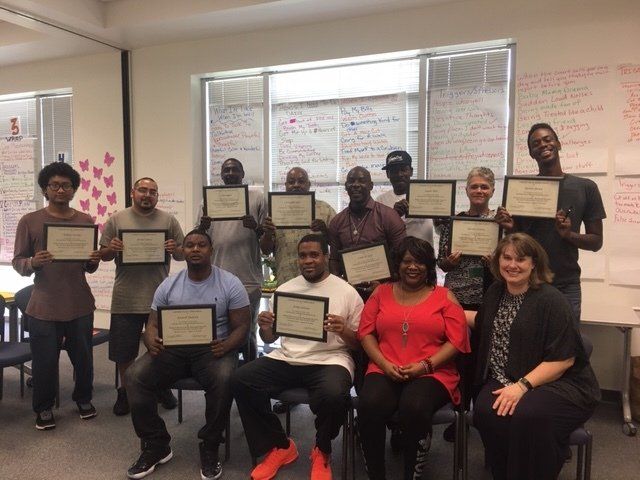Felony Mental Health Court
SPECIALTY COURTS WE SERVE
Houston
Fort Bend
Galveston
Felony Mental Health Court
Slide title
Felony Mental Health Court Wellness Recovery Action Plan workshop attendees in June 2019.
Button
The FMHC is based on the national problem-solving court model. It is a collaborative partnership between the criminal justice system, a network of community-based providers and the participant. The ultimate goal of the FMHC is to ensure public safety and minimize recidivism while diverting defendants with a mental illness from incarceration and instead connecting them to the appropriate treatment and community resources. The FMHC program is recovery-based and designed to accommodate a full range of identified needs while providing structure and guidelines to help participants reach their goals. At the beginning of the program, more intensive supervision and treatment opportunities are expected.
An important element of the FMHC program is ensuring that each participant successfully manages the transition from a highly intensive level of supervision, treatment and support to a reduced level of treatment and support. This is accomplished through the development and application of an individualized Wellness Action Plan which is designed to help the participant maintain stability upon completion of the program. Under the leadership of program director Jeannette Kolarik, a team of dedicated professionals has been assembled to ensure that all aspects of the collaborative process are represented. In addition to the Judge, the FMHC team includes a licensed master’s level clinical supervisor, a licensed master’s level court clinician, a social work case manager, two dedicated assistant district attorneys, two dedicated defense attorneys from the Public Defender’s office, two dedicated community supervision officers, and the participant.
PROGRAM NEEDS
- Valuable “incentives” or rewards for program participants who are making significant steps, big and small, towards their goals to improve their overall mental health, well-being and success in the program.
- Emergency housing to ensure program participants have a safe and stable place to stay that is supportive of mental health, substance use recovery and living a crime-free life.
- Access to specialized treatment such as family therapy and evidence-based treatment such as Cognitive Behavior Therapy and Dialectic Behavioral Therapy.
- Access to targeted therapies to help heal and empower those affected by trauma and co-occurring disorders.
- Gas cards, taxi vouchers and METRO money to assist participants overcome some of the basic barriers to access to care.
SUCCESS STORIES
Mia
Mia* came into the Felony Mental Health Court approximately two years after its inception. She was charged with Burglary of a Habitation, having broken into the apartment of her stepsister and attacked her. Mia entered FMHC with multiple mental health diagnoses including Major Depressive Disorder, Generalized Anxiety Disorder, Post Traumatic Stress Disorder and Borderline Personality Disorder. She had been receiving mental health care through a private provider, but needed access to affordable mental health care when she lost her job as a middle school teacher and her license to teach due to her criminal charge and ongoing mental health issues, which were exacerbated by complicated grief related to the death of her unborn child a few months prior to the offense.
When Mia entered the FMHC, she was eager to receive the help she needed. She readily engaged in psychiatric and therapy services through the local mental health authority and maintained her focus on working toward her goals of successfully completing the FMHC program, becoming mentally healthy and regaining her license to teach.
During Mia’s tenure in the FMHC program, she battled additional emotional challenges when her mother became terminally ill and she became pregnant again. Given the fact that Mia was the target of persistent negative remarks about her previous miscarriage from her boyfriend (the father of her baby), one might expect her to crumble under the pressure. But her determination remained. Mia provided support for her mother, remained engaged in her mental health care, and continued to meet or exceed the requirements of the FMHC program.
In the end, Mia had her baby, graduated from the Felony Mental Health Court program with early termination of her probation and regained her license to teach! She’s become a successful mother and teacher, living a life of quality.
*name has been changed
Sign up for our newsletter
Newsletter Signup
Thank you for signing up for our newsletter. We look forward to sharing our successes with you!
Oops, there was an error submitting your email.
Please try again later.
